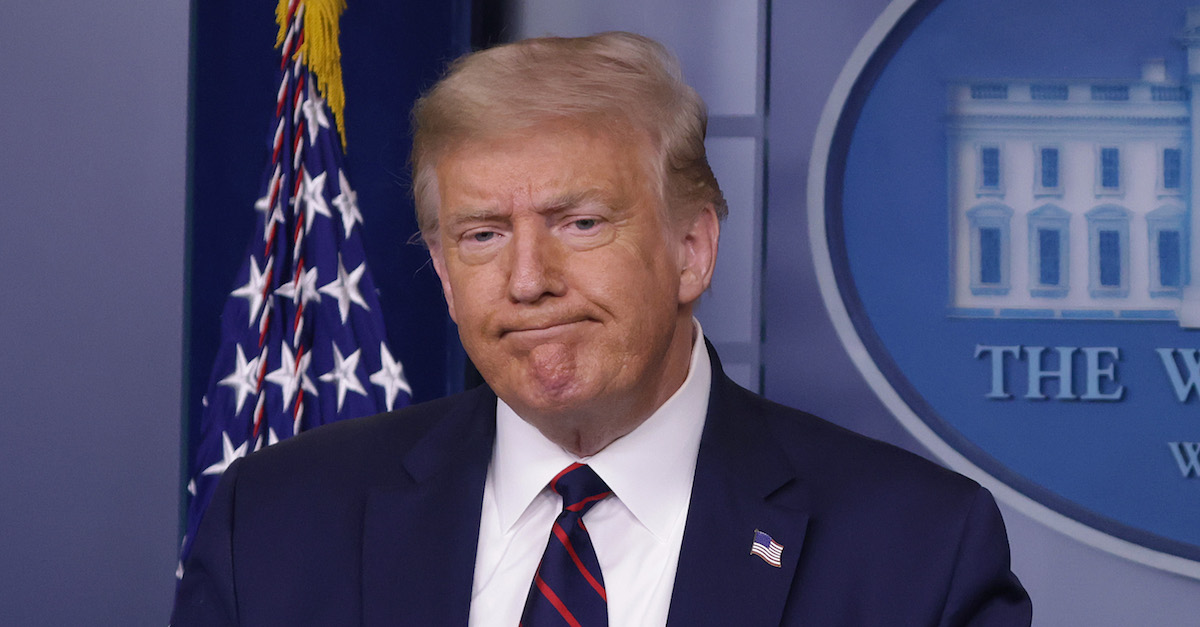
The Trump Organization is asking, once again, that attorney-client privilege serve as a shield to prevent documents from seeing the light of a courtroom. This time, the lawyer is Charles Martabano. This time, the case is New York Attorney General Letitia James‘s (D) fraud investigation, particularly regarding a potentially improper tax deduction for a Westchester property.
The property, called the “Seven Springs Estate,” is one of four properties that is the subject of James’s investigation. According to the Wall Street Journal, a Trump Organization subsidiary bought the estate for $7.5 million in 1995, and attempted to develop it for years. Then, in 2015, Trump agreed to establish a “conservation easement” to provide a habitat for rare salamanders and bats. As of 2016, property was valued at $56.5 million, and the easement at $21.1 million. According to some reports, the easement has allowed Trump to avoid over $2.2 million in taxes.
James is inquiring as to whether the estate’s “conservation easement” is legitimate; now, documents held by Martabano may be relevant to that easement.
At the risk of being dreadfully repetitive, Team Trump seems again to be struggling with how attorney-client privilege operates. Here’s a quick recap.
Attorney-client privilege protects truthful information from authorities. It exists to safeguard the attorney-client relationship by encouraging clients to be open and honest with their lawyers; theoretically, a well-informed lawyer is best equipped to zealously defend a client, no matter the client’s actual guilt. And in the particular context of criminal prosecutions, a defendant’s Fifth Amendment right against self-incrimination wouldn’t be very effective if that defendant’s lawyer could be compelled to reveal client confidences.
However, the attorney-client privilege–as Trump may have learned from the occasions he has failed to successfully assert it—is pretty darn limited. It only applies to cases in which there is an actual attorney-client relationship, and it only exists within the precise scope of that representation. What is never within the scope of legitimate attorney-client representation is crime. That’s why we have the “crime-fraud exception” to the privilege.
If a client uses an attorney’s legal work to commit a crime, that legal work is not protected by privilege–even if the lawyer is blissfully unaware of the crime afoot. Trump, by the way, should know this.
Martabano is a land-use lawyer who specializes in real-estate development. Saying that attorney-client privilege applies to his work in an investigation about that very work is, well, a lot like saying Michael Cohen’s hush payment to Stormy Daniels are privileged in an investigation about the legality of those payments. If Martabano has documents about the creation of an illegal easement, those documents would obviously fall into the crime-fraud exception of attorney-client privilege; indeed, it would be difficult to think of a clearer example of how the crime-fraud exception operates.
Donald Trump has had a long history of mischaracterizing the attorney-client privilege. In July 2018, Trump and Rudy Giuliani accused former Trump lawyer Michael Cohen of violating the privilege by releasing a taped conversation about the hush-money payment to former Playboy model Karen McDougal; the accusation, however, fell flat given that Giuliani had already spoken publicly about the tapes.
Ultimately, a special master was appointed in the Cohen case; the special master’s job was to sift through evidence the FBI seized in raids of Cohen’s home, office and hotel room—separating from the pile documents which should be covered by attorney-client privilege.
New York Supreme Court Judge Arthur Engoron has already, several times, extended the deadline for Martabano to produce the documents in question. This report on the battle over documents in the Seven Springs Estate investigation comes a day after Eric Trump finally sat for a deposition amid Letitia James’s ongoing investigation.
Donald Trump’s track record of asserting privileges—be they the attorney-client kind or the executive kind—isn’t a good one. Nonetheless, he appears undeterred, and continues to raise the argument at every turn.
[image via Alex Wong/Getty Images]
This is an opinion piece. The views expressed in this article are those of just the author.